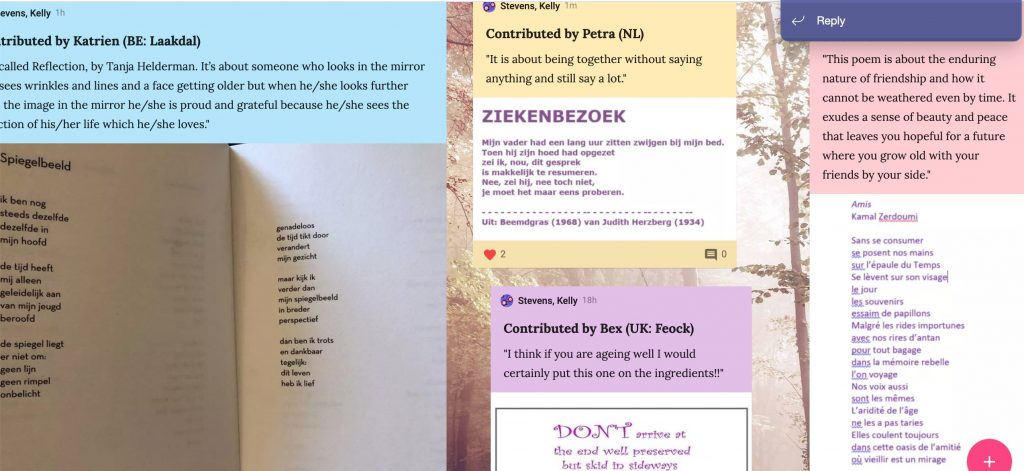This month’s blog post is a research reflection penned by Shuks Esmene, our doctoral research fellow.
HAIRE’s CREATE workshops (held June 2021) brought together the partnership to discuss our initial ideas for innovations to improve the wellbeing of local older adults in our pilot sites. The research tools being used in HAIRE are a key part of the
project’s learning. Notably, the experiences and ideas of all project partners,
including volunteers and participants, are as important as these tools in
identifying person-centred and place-based actions that are locally relevant.
Our poetry workshop demonstrated that HAIRE’s delivery partners and
research teams have been able to build a comfortable environment for
discussion – even in these challenging times! Memories of older adults that we
hold special connections to, including parents, grandparents, other family
members and friends, filled the session with emotion. One of our partners
simply remarked, “These are not sad tears!”

Some of the poetry about ageing shared at our CREATE session
The remark above related to a late grandparent and sums up how connections to
people that we value go beyond being in their physical presence. Although a
small moment in HAIRE’s activities, reflections from such experiences can help
HAIRE start conversations around embedding care into communities. A deeper
care. Care that surpasses the functional needs of people. These needs are, of
course, extremely important. However, wellbeing is much more than the sum of
someone’s functional needs.
HAIRE’s Guided Conversations showed how valued activities and passions (walking, knitting, reading and going to local markets, to name a few) provided participants with joy and, unfortunately, sadness due to missing these activities and passions during the pandemic. These findings are in no way unique to HAIRE, but they do present the project with opportunities. The close-knit, caring network of people that HAIRE has engaged can help us to think differently about how we can act on these findings. A record of valued activities and passions in an area, and trying to ensure these activities are offered to locals is important, but opportunities to develop new interests and passions can be seen as a way of adding capacity to a place. Variety and extracurricular activities are regarded as a fundamental part of development in children (1).
I often reflect on why we try to find and measure a set of specific activities that show
benefit when adults are considered – rather than addressing how we can best
understand wellbeing priorities at an individual level. As stated during our
discussions about innovation on the second day of our CREATE workshops,
“…being willing to start small” to achieve innovations that stay open to input
from locals can make a difference – particularly if voices and perspectives are
responded to and not lost in bureaucratic processes. As such, digital solutions
are important in improving outreach, but it was encouraging to see ideas
develop around face-to-face activities and “going to people”.

A French Guided Conversation in action
Face-to-face interactions and events that bring people together were certainly
valued in responses to HAIRE’s Guided Conversations. Additionally, even if
revealed through anecdotes, we cannot overlook how local shop owners and
doctors used to be more deeply embedded in rural neighbourhoods. Services
were more face-to-face and such experiences need to be considered when
bringing older adults together.
Importantly, concerns around the participant profiles engaged by HAIRE so far
were raised at CREATE. Outreach that engages and is inclusive of vulnerable and marginalised groups is often referred to as challenging (2). Inclusive
communities ensure that everyone can feel part of where they live and, through
being able to voice and discuss their opinions, individuals can contribute to
shaping the future of a place. How we achieve more inclusive understandings of
wellbeing will be an important challenge for HAIRE and “…being willing to
start small” can benefit the project here too. Research can tend to focus on
numbers and achieving outcomes that are generated by large, so-called
representative groups. However, if we ask critical questions of the differing
perspectives that we have been able to gather through HAIRE’s Guided
Conversation, we can start small. Questions such as: why can someone that has
cared for others and worked hard in a sector that is not economically
generous end up in a financially precarious position in later life?, and, what
can we do to involve someone locally that has not been able to develop and/or
pursue interests due to a turbulent childhood and early adult life?
Finally, the question that stands out for me the most from our CREATE sessions
was: “Why, as a society, are we so rubbish at this?” The answer may lie in re-thinking care, where care is received and given by individuals in communities and not simply a service that aims to meet the functional needs of older adults. Encouragingly, we have examples in HAIRE where this has been achieved – whether it be between the researchers and delivery teams, between the delivery teams and the volunteers and/or between the volunteers and participants. Our next challenge is to find ways to engage the caring people on the project, across all sites, more closely. I look forward to
working on that challenge.
Footnotes 1. Metsäpelto, R., & Pulkkinen, L. (2012). Socioemotional Behavior and School Achievement in Relation to Extracurricular Activity Participation in Middle Childhood. Scandinavian Journal Of Educational Research, 56(2), 167-182. doi: 10.1080/00313831.2011.581681 2. Meyer, C., Evans, D., Soucat, A., Dkhimi, F., Akweongo, P., & Kessy, F. et al. (2018). Leaving no one behind? Reaching the informal sector, poor people and marginalised groups with Social Health Protection. Journal Of Poverty And Social Justice. doi: 10.1332/175982718x1536143686739
Shukru Esmene, s.esmene@exeter.ac.uk, University of Exeter
